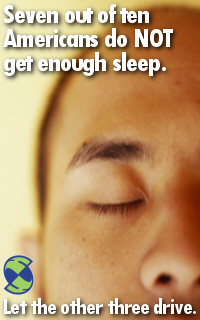 How Safe A Sleeper Are You? How Safe A Sleeper Are You?
Here are seven statements about sleep. See if you know which
ones are True and which are False.
| 1 |
I'll know when I'm falling asleep. |
| 2 |
Coffee overcomes the effects of drowsiness while driving. |
| 3 |
I'm a safe driver so it doesn't matter if I'm sleepy. |
| 4 |
I can't take naps. |
| 5 |
I get plenty of sleep. |
| 6 |
Being sleepy makes you misperceive things. |
| 7 |
Young people need less sleep. |
Answers:
- 1. False.
If you said true, you're like most people - you believe you can control your sleep. In tests, nearly four-fifths of people said they could predict when they were about to fall asleep. They were wrong. The truth is, sleep is not voluntary. If you're drowsy, you can fall asleep and never know it. You also cannot tell how long you've been asleep. When you're driving, being asleep for even a few seconds can kill you or someone else. If you experience any of these danger signs, take them as a warning that you could fall asleep without meaning to:
- Your eyes close or go out of focus by themselves.
- You have trouble keeping your head up.
- You can't stop yawning.
- You have wandering, disconnected thoughts.
- You don't remember driving the last few miles.
- You drift between lanes, tailgate, or miss traffic signs.
- You keep jerking the car back into the lane.
- You have been jolted to attention by tire noise or a near crash due to drifiting.
- 2. False.
Stimulants are no substitute for sleep. Drinks containing caffeine, such as coffee or cola can help you feel more alert, but the effects last only for a short time. If you drink coffee and are seriously sleep-deprived, you are still likely to have "micro-sleeps" - brief naps that last around four or five seconds. At 55 miles an hour, that's more than 100 yards, and plenty of time to cause an accident.
- 3. False.
The only safe driver is an alert driver. Even the safest drivers become confused and use poor judgment when they are sleepy. The young man awarded "America's Safest Teen Driver" in 1990 later fell asleep behind the wheel and was killed. In order to be a safe driver you must have your eyes open - and that means staying off the road when you're sleepy. In addition, to a tired person, one drink feels like four or five. If it's late and you know you have to drive, don't make matters worse by drinking
- 4. False.
Many people insist they can't nap. Yet even people who say they are not tired will quickly fall asleep in a darkened room if they have not been getting enough sleep. If you think you can't nap, stop the car and recline for 15 minutes anyway. You may be surprised at how easily you fall asleep once you give yourself the chance. If you're concerned about safety, plan your route so you can use well-lit rest stops or truck stops on heavily traveled roads. The busier the place you stop to rest, the less opportunity for crime. Always lock doors and roll up windows
- 5. False.
Chances are good that you really aren't getting all the sleep you need. If you said "True," ask yourself: "Do I wake up rested?" The average person needs seven or eight hours of sleep a night. If you go to bed late and wake up early to an alarm clock, you probably are building up a sleep debt during the week. If you spend eight hours in bed but still feel tired, you may have a disorder preventing you from getting enough sleep. Whatever the cause, avoid driving when you feel drowsy. Rearrange your schedule so you get enough sleep during the week
- 6. True.
Have you ever driven at night and seen something you thought was an animal but turned out to be a paper bag or a dead leaf? That's only one of the many ways sleepy drivers misjudge their surroundings. A drowsy driver doesn't process information as fast or as accurately as an alert driver and is unable to react quickly enough to avoid a collision.
- 7. False.
In fact, teenagers and young adults need more sleep than people in their thirties. They often get less, because they enjoy staying up late and have a wide range of responsibilities. Teenagers and young adults who get up early tend to feel alert in the evening. They think that means they don't need much sleep. The problem is, the temporary alertness wears off later, and they can end up driving home drowsy.
|
 How Safe A Sleeper Are You?
How Safe A Sleeper Are You? How Safe A Sleeper Are You?
How Safe A Sleeper Are You?